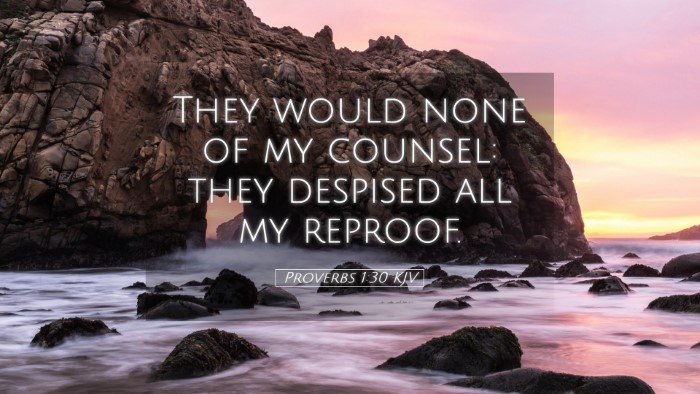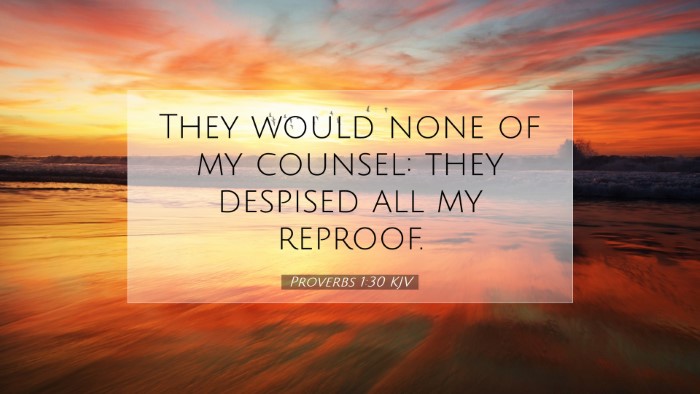Commentary on Proverbs 1:30
Verse: "They would none of my counsel: they despised all my reproof."
This verse serves as a poignant reminder of the refusal to heed wisdom and counsel, particularly as it applies to God's guidance. In exploring the depths of this scripture, insights from eminent public domain commentaries are combined to offer a rich understanding for pastors, students, theologians, and Bible scholars.
Contextual Overview
Proverbs chapter one opens with a significant introduction to the nature of wisdom, contrasting the paths of the wise and the foolish. The fatherly voice of instruction culminates in a lament over the stubbornness of the unwise who reject divine counsel—the thematic essence of Proverbs 1:30.
Insights from Commentators
Matthew Henry's Commentary
Matthew Henry remarks that this verse encapsulates the tragic consequences of ignoring God’s guidance. He emphasizes the profound sorrow that accompanies those who forsake wisdom, illustrating that the refusal to embrace counsel equates to the rejection of the very source of wisdom—the Lord Himself.
- Rejection of Counsel: The phrase “none of my counsel” underscores a deliberate decision to disregard wise instruction.
- Despising Reproof: Henry indicates that to despise reproof is an act of folly, showcasing a lack of humility and an elevation of one's own understanding over divine wisdom.
- Consequences: He warns that such behavior leads to eventual ruin, asserting that wisdom will not strive forever with those who continually reject her.
Albert Barnes' Commentary
Albert Barnes emphasizes the moral implications present within the text, highlighting a common theme throughout the Book of Proverbs: the conflict between wisdom and folly.
- Intention: Barnes points out that the individual's refusal of counsel is a conscious decision, often driven by pride or self-sufficiency.
- Moral Apathy: He illustrates that those who despise reproof often become apathetic toward their moral downfall, blinded by their own desires.
- Divine Retribution: Barnes posits that refusing God’s counsel ultimately invites calamity upon oneself, provoking God’s inevitable wrath as a response to persistent disobedience.
Adam Clarke's Commentary
Adam Clarke approaches the verse with a focus on the broader implications of rejection, asserting that wisdom itself is personified in these writings. He contrasts the response to wisdom with the results that follow such actions.
- The Personification of Wisdom: Clarke elaborates that wisdom speaks as a genuine entity, longing for acceptance yet often met with disdain.
- Reproof as Guidance: He suggests that reproof is a manifestation of love, intended to steer individuals back to righteousness and clarity.
- Cultural Context: Clarke interlaces cultural insights pertinent to ancient Israel, emphasizing that the rejection of wise counsel was not merely personal but a communal affront against their societal values.
Theological Implications
The refusal to accept God’s counsel and despise reproof bears significant theological weight. It poses questions regarding human nature, free will, and the divine response to human rebellion.
- Human Responsibility: The verse stresses that individuals possess the agency to accept or reject wisdom, highlighting the biblical theme of free will.
- The Nature of God: This refusal also reveals insights into God’s nature—He is patient but will not wait indefinitely for humanity to respond to His overtures of grace.
- Hope for the Foolish: Despite the severity of the admonition, there remains a glimmer of hope. Those who have rejected counsel can repent and seek wisdom anew.
Practical Applications
For pastors, students, and church leaders, Proverbs 1:30 serves as a call to foster an atmosphere of wisdom within the community.
- Encouragement of Wisdom: Actively encourage the seeking of godly counsel within the church community, emphasizing the importance of mentors and leaders.
- Reproof as Restoration: Frame reproof not as punitive but as redemptive and constructive, essential for spiritual growth.
- Vulnerability to Wisdom: Model humility and openness to reproof, demonstrating through personal examples how to receive correction gracefully.
Conclusion
Proverbs 1:30 serves as both a warning and an invitation—a sobering reminder that the path of wisdom is neither guaranteed nor automatic. Though many will reject counsel, the faithful must continue to uphold the truth of God’s wisdom, offering guidance to others in love and conviction. Embracing the truths distilled from the insights of respected commentators encourages a deeper engagement with scripture and strengthens the believer’s commitment to living a life aligned with divine wisdom.


